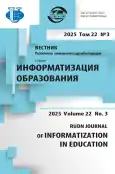Comparative analysis of international practices in teaching programming to schoolchildren
- Authors: Bosenko T.M.1, Sadykova A.R.1, Levchenko I.V.2
-
Affiliations:
- Moscow City University
- Moscow Pedagogical State University
- Issue: Vol 22, No 3 (2025)
- Pages: 255-267
- Section: TEACHING COMPUTER SCIENCE
- URL: https://journal-vniispk.ru/2312-8631/article/view/321322
- DOI: https://doi.org/10.22363/2312-8631-2025-22-3-255-267
- EDN: https://elibrary.ru/QEMSMM
- ID: 321322
Cite item
Full Text
Abstract
Problem statement. Presents a comparative analysis of international practices in teaching programming to schoolchildren in the context of technologization of modern society. The purpose of the study is to identify the most effective practices in teaching programming based on a comprehensive analysis of international experience to assess the feasibility of their implementation in the Russian school education system. The study showed the experience of nine countries (Great Britain, Germany, China, Singapore, USA, Finland, Estonia, South Korea, Japan), selected as representative representatives of various educational systems and leaders of digital transformations of education in their regions. Methodology. Based on a comprehensive analysis, three main models of teaching programming were identified and classified: integrated, specialized and hybrid. A comparative analysis of international practices allowed for a comparative study of educational systems in various countries. The statistical analysis of performance indicators was based on the processing of quantitative data on student performance and the results of international studies . Results. The results of the study made it possible to formulate a scientifically based assessment of the feasibility of introducing international practices into the educational system, taking into account the age characteristics of students. Conclusion. It has been established that the most successful international educational systems are characterized by a balanced development of infrastructural, methodological and personnel components.
About the authors
Timur M. Bosenko
Moscow City University
Email: bosenkotm@mgpu.ru
ORCID iD: 0000-0002-5375-096X
SPIN-code: 7117-2458
Associate Professor of the Department of IT, Management and Technology, Institute of Digital Education
28 Sheremetyevskaya St, Moscow, 129594, Russian FederationAlbina R. Sadykova
Moscow City University
Author for correspondence.
Email: sadykovaar@mgpu.ru
ORCID iD: 0000-0002-1413-200X
SPIN-code: 7107-7576
Professor of the Department of Informatics, Management and Technology, Institute of Digital Education
28 Sheremetyevskaya St, Moscow, 129594, Russian FederationIrina V. Levchenko
Moscow Pedagogical State University
Email: iv.levchenko@mpgu.su
ORCID iD: 0000-0002-1388-4269
SPIN-code: 8484-7769
Doctor of Pedagogical Sciences, Professor of the Department of Theory and Methods of Teaching Mathematics and Informatics, Institute of Mathematics and Informatics
14 Krasnoprudnaya St, bldg 1; Moscow, 107140, Russian FederationReferences
- Huang S, Liu C, Xu Y. A Comparative study on programming education – based on China and America. Journal of Education, Humanities and Social Sciences. 2023;15: 220–231. https://doi.org/10.54097/ehss.v15i.9272
- Lee I, Grover S, Martin F, Pillai S, Malyn-Smith J. Computational thinking from a disciplinary perspective: integrating computational thinking in K-12 science, technology, engineering, and mathematics education. Journal of Science Education and Technology. 2019;29(1):1–8. https://doi.org/10.1007/s10956-019-09803-w
- Lindberg R, Laine T, Haaranen L. Gamifying programming education in K-12: a review of programming curricula in seven countries and programming games. British Journal of Educational Technology. 2019;50(4):1979–1995. https://doi.org/10.1111/bjet.12685
- Waite J, Curzon P, Marsh W, Sentance S. Difficulties with design: the challenges of teaching design in K-5 programming. Computers and Education. 2020;150:103838. https://doi.org/10.1016/j.compedu.2020.103838 EDN: WTWMDG
- Pasternak A, Hellmig L, Röhner G. Standards for higher secondary education for computer science in Germany. In: Pozdniakov SN, Dangiené V. (eds.) Informatics in Schools. Fundamentals of Computer Science and Software Engineering: 11th International Conference on Informatics in Schools: Situation, Evolution, and Perspectives, ISSEP 2018, 10–12 October 2018, St. Petersburg, Russia. Cham: Springer; 2018. p. 103–114. https://doi.org/10.1007/978-3-030-02750-6_9
- Sianturi M, Lee J, Cumming T. Using technology to facilitate partnerships between schools and Indigenous parents: a narrative review. Education and Information Technologie. 2023;28(5):6141–6164. https://doi.org/10.1007/s10639-022-11427-4 EDN: PQDDTJ
- Seow P, Looi CK, How ML, Wadhwa B, Wu LK. Educational policy and implementation of computational thinking and programming: case study of Singapore. In: Kong S-Ch, Abelson H. (eds.) Computational Thinking Education. Singapore: Springer; 2019. p. 337–345. https://doi.org/10.1007/978-981-13-6528-7_19
- McGill M, Reinking A. Early findings on the impacts of developing evidence-based practice briefs on middle school computer science teachers. ACM Transactions on Computing Education. 2022;22(4):1–29. https://doi.org/10.1145/3543512
- Korhonen T, Salo L, Laakso N, Seitamaa A., Sormunen K, Kukkonen M, Maanonen H. Finnish teachers as adopters of educational innovation: perceptions of programming as a new part of the curriculum. Computer Science Education. 2022;33(1):94–116. https://doi.org/10.1080/08993408.2022.2095595 EDN: CGXTDF
- Pata K, Tammets K, Vyaljataga T, Kori K, Laanpere M, Rybtsenkov R. The patterns of school improvement in digitally innovative schools. Technology, Knowledge and Learning. 2022;27(3):823–841. https://doi.org/10.1007/s10758-021-09514-5 EDN: IWIAQM
- Kim K, Koo D, Kim Se, et al. Development a standard curriculum model of nextgeneration software education. Journal of The Korean Association of Information Education. 2020;24(4):337–367. https://doi.org/10.14352/jkaie.2020.24.4.337 EDN: APFRJS
- Yamanaka Sh, Suzuki K. Japanese education reform towards twenty-first century education. In: Reimers FM. (ed.) Audacious Education Purposes. Cham: Springer; 2020. p. 81–103. https://doi.org/10.1007/978-3-030-41882-3_4
- Barhatova DA, Lomasko PS, Pak NI. Smart environment model for training future informatics teachers in programming under network cluster-distributed integration. Informatics and Education. 2018;(8):11–19. (In Russ.) https://doi.org/10.32517/02340453-2018-33-8-11-19 EDN: YNHKJF
- Cheng M. An overview of STEM education in Asia. In: Cheng M, Buntting C, Jones A. (eds.) Concepts and Practices of STEM Education in Asia. Singapore: Springer; 2022. p. 1–15. https://doi.org/10.1007/978-981-19-2596-2_1
- Zhang W, Zeng X, Wang J, Ming D, Li P. An analysis of learners programming skills through data mining. Education and Information Technologies. 2022;27(8):11615– 11633. https://doi.org/10.1007/s10639-022-11079-4 EDN: ADQHDQ
- Mannila L, Dagiene V, Demo B, Grgurina N, Mirolo C, Rolandsson L, Settle A. Computational thinking in K-9 education. In: Clear A, Lister R. (eds.) ITiCSE- WGR ‘14: Proceedings of the Working Group Reports of the 2014 on Innovation & Technology in Computer Science Education Conference, 23–25 June 2014, Uppsala, Sweden. New York: Association for Computing Machinery; 2014. p. 1–29. https://doi.org/10.1145/2713609.2713610
- Kong S, Lai M, Sun D. Teacher development in computational thinking: design and learning outcomes of programming concepts, practices and pedagogy. Computers & Education. 2020;151:103872. https://doi.org/10.1016/j.compedu.2020.103872
Supplementary files









